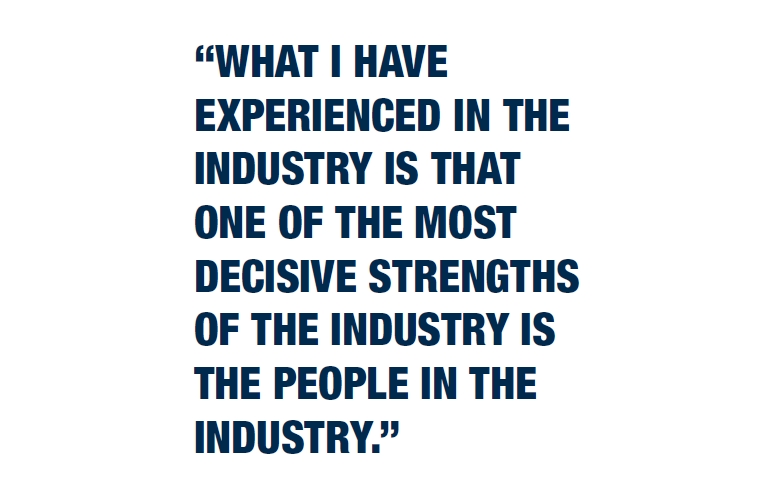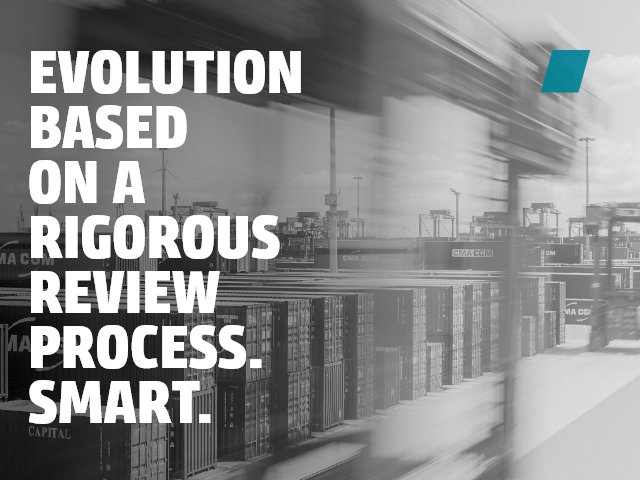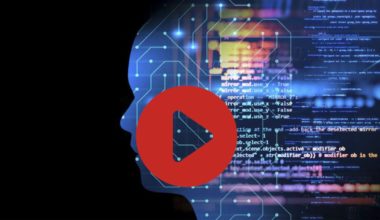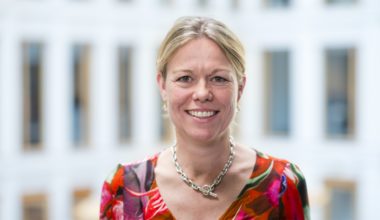Inform has proven that the company is not shy to explore the future and what it might hold for our industry. From the original 2038: A Smart Port Story through to insightful presentations at both our Container Terminal Automation Conference and Smart Digital Port Events over the past years, they are always pushing the boundaries of today. In this exclusive interview with Port Technologie International, Dr. Eva Savelsberg, Senior Vice President at Inform, talks about the economic trends that will shape our industry over the coming decades, why diversity and data are at the heart of Inform’s strategy moving forward, and the role of humans in the automation equation.
Table of Contents
- WHAT DO YOU SEE AS THE LARGE ECONOMIC TRENDS THAT THE MARITIME INDUSTRY NEEDS TO BE FOCUSING ON OVER THE COMING DECADE?
- YOU NOTED THAT SUSTAINABILITY IS MORE THAN JUST CLIMATE SUSTAINABILITY. INFORM HAS EMBRACED THE UN SUSTAINABILITY DEVELOPMENT GOALS (SDGS). WHY?
- IF THE WORLD IS CHANGING AROUND US, MANY WOULD ARGUE THAT MEANS WE NEED TO BE MORE INNOVATIVE IN OUR INDUSTRY. WHAT IS YOUR VIEW OF INNOVATION?
- AI, SPECIFICALLY THE APPLICATION OF MACHINE LEARNING, IS AN EXAMPLE OF THE MOST RECENT INNOVATION WE ARE SEEING WITHIN TERMINALS. YOU HAVE RECENTLY DELIVERED MACHINE LEARNING INTO ONE OF YOUR PORT CUSTOMERS’ OPERATIONS. WHAT IMPACT WILL AI AND MACHINE LEARNING HAVE FROM AN INNOVATION PERSPECTIVE ON OUR INDUSTRY?
- IN YOUR RECENT PAPER, “SCREWED: THE REAL VALUE OF DATA,” YOU AND YOUR CO-AUTHOR ARGUE THAT DATA IS THE FOUNDATION THAT PORTS AND TERMINALS WILL BE BUILT ON IN THE FUTURE. WHY HAS THIS CONVERSATION SHIFTED FROM CONCRETE TO DATA?
- DATA MANAGEMENT IS A RELATIVELY OLD CONCEPT, BUT IT IS GAINING TRACTION AGAIN. YOU HAVE A SERIES COMING OUT ON DATA MANAGEMENT, THE FIRST PART OF WHICH IS IN THIS EDITION, DATA STRATEGY: PART 1 – DATA MANAGEMENT IS FUNDAMENTAL. WHY IS INFORM FOCUSING ON DATA MANAGEMENT NOW?
- DIFFERENT COMPANIES OR STAKEHOLDERS HAVE A DIFFERENT END GOAL FOR THE DATA THEY ARE GENERATING. IS THAT COMPETITIVENESS HOLDING BACK ANY PROGRESSION THAT WE MIGHT SEE AS AN INDUSTRY ON DATA STANDARDIZATION? AND, IF SO, HOW DO WE MOVE PAST THAT?
- CYBERSECURITY. YOU NOTED THAT IT IS GOING TO BE QUITE IMPORTANT AS WE EMBRACE DIGITALIZATION. WHAT IS INFORM DOING TO ENRICH ITS CYBERSECURITY WITHIN ITS SOFTWARE? IS THE INDUSTRY TAKING CYBERSECURITY SERIOUSLY ENOUGH? IS ENOUGH BEING DONE?
- IN OUR INDUSTRY, ONE OF THE BIGGEST BUZZWORDS TO EMERGE FROM 2019 WAS “ECOSYSTEMS.” AN ECOSYSTEM IMPLIES A DIVERSE RANGE OF STAKEHOLDERS WORKING TOGETHER TO ACHIEVE MUTUAL SUCCESS, AS OPPOSED TO THE CURRENT TREND OF LARGE PLATFORMS FROM SINGLE VENDORS. WHICH IS THE RIGHT DIRECTION? SHOULD WE BE PUSHING FOR AN ECOSYSTEM OF VENDORS OR CONTINUE WITH THE ONE-STOP PLATFORMS, AND WHY?
- WHAT SINGLE TECHNOLOGY DO YOU THINK WILL HAVE THE LARGEST IMPACT IN THE COMING DECADE, AND WHY?
- WHAT IS THE ONE PIECE OF ADVICE YOU WOULD LOVE TO LEAVE FOR OUR INDUSTRY?

WHAT DO YOU SEE AS THE LARGE ECONOMIC TRENDS THAT THE MARITIME INDUSTRY NEEDS TO BE FOCUSING ON OVER THE COMING DECADE?
This first trend is our focus on sustainability. As a society, we see we probably have to do a lot more to address sustainability in all its different facets. To be successful to hand over a functioning Earth in the future to our kids and grandchildren. To tap into the potential of diversity.
A further trend is also the shift of the global center of economic gravity, which will shift to the East over the next few decades, and this will also bring decisive changes to us. Today we are a very well-educated, affluent society, and I believe, especially within the European Union, our voice has value. Perhaps this value might shrink over the next decades. I am not convinced we are prepared for this situation.
In addition, how the United States positions itself globally will also impact us. Finally, the African youth bulge will play a part in shaping our industry. While many European and Asian societies are shrinking or will shrink, 60% of African society is under 25 and will grow over the next decades. From an economic point of view, today trading routes are strong between China and Europe and between China and the US. But, with all the young people in Africa, those routes will change undoubtedly in the future. Are we prepared for that? How do we want to participate in this shift of trade?
YOU NOTED THAT SUSTAINABILITY IS MORE THAN JUST CLIMATE SUSTAINABILITY. INFORM HAS EMBRACED THE UN SUSTAINABILITY DEVELOPMENT GOALS (SDGS). WHY?
Inform is already quite a mature company. We are 50 years old. Early on, the spirit of the company grew to base their strategies on sustainability in terms of customer relationships and in terms of cooperation with employees and giving them a healthy and satisfying working environment. The move to adopt the UN’s SDGs was not a big step as it is in our genes. At a management level, we have formulated our thinking that it’s not only about profit, but it’s as well about people and planet – three P’s instead of just the one.
IF THE WORLD IS CHANGING AROUND US, MANY WOULD ARGUE THAT MEANS WE NEED TO BE MORE INNOVATIVE IN OUR INDUSTRY. WHAT IS YOUR VIEW OF INNOVATION?
I think the industry has some challenges with innovation. The margins are not so great, we have very long asset cycles, and profit has to split between different parties. As such, we have to implement existing innovations and take the risks. I think perhaps, for the time being, it’s not so much about the next huge innovation we haven’t thought of. I think there is a big challenge in adapting all those innovations which are already out there. Take, for example, autonomous vessels or the smart port and smart city concepts. How do we implement these ideas and make them actually work? How do we introduce cyber-physical-human systems into the port business? Connected to that are the industrial internet of things (IIoT) and Digital Twins. These are a big step forward in digitalization. We’ve already thought about them, so it’s not “innovation” per se. The real question is how do we implement these ideas to have them working smoothly while also taking care of the cybersecurity issues coming with increased digitalization?
AI, SPECIFICALLY THE APPLICATION OF MACHINE LEARNING, IS AN EXAMPLE OF THE MOST RECENT INNOVATION WE ARE SEEING WITHIN TERMINALS. YOU HAVE RECENTLY DELIVERED MACHINE LEARNING INTO ONE OF YOUR PORT CUSTOMERS’ OPERATIONS. WHAT IMPACT WILL AI AND MACHINE LEARNING HAVE FROM AN INNOVATION PERSPECTIVE ON OUR INDUSTRY?
AI and machine learning are tools and you have to be efficient in using those tools because otherwise they won´t bring you any benefit. We implemented machine learning at the Container Terminal, Burchardkai, in Hamburg. Until now, the port has had to dedicate some of its space to unknown transshipment. They have always had this area in the automated blocks which was dedicated for containers of which they did not know how the containers were leaving the port. Now, using our machine learning module, they know a lot more precisely how a container will leave the port, be it by train, truck, or ship. From here they can better place containers in the yard and reduce the yard allocation for unknown containers. The module also reduces a lot of the unnecessary re-handlers. The real innovation is in connecting the machine learning module with the optimization modules. The machine learning gives a strong data base to the optimization module. From there, the optimization can take that information and decide, based on the current situation, what the smart strategy for stacking and equipment utilization is. This connection brings a multiplied benefit to the customer greater than what either of the individual modules can achieve on their own.

SYNCROTESS
Add-on Module

Machine Learning improves the accuracy of operational data used for real-time decision-making and long-term strategic management planning.
IN YOUR RECENT PAPER, “SCREWED: THE REAL VALUE OF DATA,” YOU AND YOUR CO-AUTHOR ARGUE THAT DATA IS THE FOUNDATION THAT PORTS AND TERMINALS WILL BE BUILT ON IN THE FUTURE. WHY HAS THIS CONVERSATION SHIFTED FROM CONCRETE TO DATA?
To read the paper, visit: https://www.porttechnology.org/technical-papers/screwed-the-real-value-of-data/
My personal background is mechanical engineering, so I can deeply appreciate the love of steel and concrete. But, again, regarding sustainability goals, it is so important to find ways to have a lean approach, to be infrastructure lite. AI, machine learning, and Operations Research can help a lot, but they need data. It’s the fuel which enables them to do what they do – as such, data management is crucial.
DATA MANAGEMENT IS A RELATIVELY OLD CONCEPT, BUT IT IS GAINING TRACTION AGAIN. YOU HAVE A SERIES COMING OUT ON DATA MANAGEMENT, THE FIRST PART OF WHICH IS IN THIS EDITION, DATA STRATEGY: PART 1 – DATA MANAGEMENT IS FUNDAMENTAL. WHY IS INFORM FOCUSING ON DATA MANAGEMENT NOW?
The industry is about to decide how data management will be done in the future. Do they want to have specific vendors to supply data management? Do port authorities, for example, want to be the ones who do their own data management? To shape this future, to shape those thoughts, or to have a look at the different alternatives, it is important to gather the knowledge. Inform has also been doing data management for quite some time. We do it a lot in the banking industry, for example. We thought it might be a good idea to write a series about this very important topic and share our knowledge with the industry in an unbiased way so the industry is prepared to tackle those questions and make an informed decision.
DIFFERENT COMPANIES OR STAKEHOLDERS HAVE A DIFFERENT END GOAL FOR THE DATA THEY ARE GENERATING. IS THAT COMPETITIVENESS HOLDING BACK ANY PROGRESSION THAT WE MIGHT SEE AS AN INDUSTRY ON DATA STANDARDIZATION? AND, IF SO, HOW DO WE MOVE PAST THAT?
I think we must follow two paths in parallel. One is we, as an industry, have to talk about the standards, and hopefully we will find ways to become more standardized. On the other hand, we also have to push ahead, and we have to find ways to integrate and to share data with each other, even when we don’t have the standards we’d like. If you have a look at, let’s say, just something simple from today’s perspective, like an iPad, how many plugs have everybody gathered at home because it is constantly changing? It is not feasible to have waited for the current plug to be developed before you sold any iPads.
CYBERSECURITY. YOU NOTED THAT IT IS GOING TO BE QUITE IMPORTANT AS WE EMBRACE DIGITALIZATION. WHAT IS INFORM DOING TO ENRICH ITS CYBERSECURITY WITHIN ITS SOFTWARE? IS THE INDUSTRY TAKING CYBERSECURITY SERIOUSLY ENOUGH? IS ENOUGH BEING DONE?
Cybersecurity is not just an IT topic. Cybersecurity is an organizational topic, a bit like sustainability. You can’t just declare a person a sustainability officer or cybersecurity officer. You have to find ways that it is just part of the company, part of the way employers take care of what they do, be it coding or be it how they handle their laptop. How do I handle USB sticks? And so, it has to become part of how we think about our jobs. It is definitely not a future topic. Again, I think there are always two sides to this story. I think there are voices in the industry that take this very seriously and who talk and give guidelines on how to approach security. And then, as with every problem, there are the pressures and the struggles of daily life. It’s very complex how to achieve it. You have to be a step ahead. It is not something you can dwell on for a decade because then it’s the security of yesterday and it won’t be fit for tomorrow. We need bright people and smart concepts to implement security to be sure that it guarantees security without hindering daily business, without hindering cooperation between companies, and without hindering innovation.
IN OUR INDUSTRY, ONE OF THE BIGGEST BUZZWORDS TO EMERGE FROM 2019 WAS “ECOSYSTEMS.” AN ECOSYSTEM IMPLIES A DIVERSE RANGE OF STAKEHOLDERS WORKING TOGETHER TO ACHIEVE MUTUAL SUCCESS, AS OPPOSED TO THE CURRENT TREND OF LARGE PLATFORMS FROM SINGLE VENDORS. WHICH IS THE RIGHT DIRECTION? SHOULD WE BE PUSHING FOR AN ECOSYSTEM OF VENDORS OR CONTINUE WITH THE ONE-STOP PLATFORMS, AND WHY?
There will never be just one platform. That’s my take. That’s a bold statement. I think we will have strong parts of platforms from where we can integrate services, where we can integrate data management. But I think there will never be just one entity that has all the knowledge and products under one roof. I think we are facing a very dynamic future. There is this nice expression, “dynexity.” It’s about dynamics and complexity. We need an “ecosystem” of different companies, different vendors, and even different start-ups to bring the idea to a table.
WHAT SINGLE TECHNOLOGY DO YOU THINK WILL HAVE THE LARGEST IMPACT IN THE COMING DECADE, AND WHY?
The concept of cyber-physical-human systems, as noted above, is an evolution of automation and will have a huge impact because it will be a form of collaboration we are not used to. How humans and autonomous systems interact is the Fifth Industrial Revolution (5IR). We will not always have this huge pool of well-educated talent to draw on. We need more automation to help us in the future. We have to find ways to integrate automation into society in a good way. How do we help people along to be part of this automation process, to get the education, not only when they are young, but also when they are of older age, to give them the skills to cope with automation and to be part of it?
WHAT IS THE ONE PIECE OF ADVICE YOU WOULD LOVE TO LEAVE FOR OUR INDUSTRY?
What I have experienced in the industry is that one of the most decisive strengths of the industry is the people in the industry. People in the maritime industry tend to be very loyal to the industry. They are very fascinated, well-educated, and very eager to bring benefit to the industry, to push ahead, and to find ways to deal with new challenges. I think that’s a good foundation to build on.


